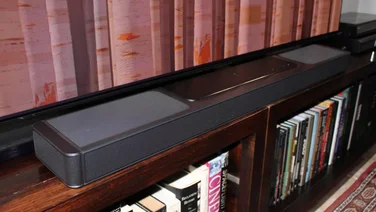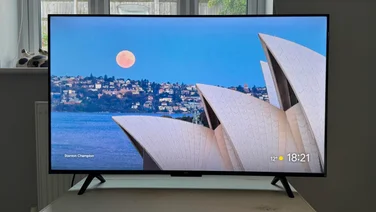To help us provide you with free impartial advice, we may earn a commission if you buy through links on our site. Learn more

Support for the Bluetooth aptX codec is something I reference a lot in audio reviews. It’s a bonus often found on more premium audio products, whether they be Bluetooth speakers or Bluetooth headphones. You can think of aptX as a way of achieving CD-quality audio wirelessly while working within the limited wireless bandwidth provided by the Bluetooth Advanced Audio Distribution Profile (A2DP).
The aptX codec itself dates all the way back to the 1980s where it was developed at Queen’s University Belfast as part of a PhD but it’s only been in the past five or so years that it’s been used between Bluetooth devices. The aptX codec was acquired by Cambridge Silicon Radio (CSR), which was then later acquired by Qualcomm in August 2015. The latter you might know for its Snapdragon mobile processors and chipsets used in many of today’s smartphones.
Today, aptX is supported by manufacturers from Ultimate Ears to Audio Pro to Philips. Windows 10 now also supports the aptX encoder, so there’s no shortage of compatibility. Now, with aptX HD, Qualcomm is looking to further improve the audio quality afforded by a Bluetooth wireless connection. Where the original Bluetooth aptX codec supported 16-bit audio, aptX HD expands this to 24-bit audio. This is achieved by an extra two bits for each of the sub-bands of processing.
What this means in reality, as I was told by Johnny McClintock, Qualcomm’s aptX director of sales and marketing, is that you’ll notice the increase in audio fidelity more in the higher frequencies. So while the lower-end bass should be more refined, you’ll hear more of the extra detail in the mids and trebles due to how the extra bits are distributed.
What this should mean is lower signal-to-noise and less distortion. Qualcomm says this is ideal for high-resolution audio systems, although it’s worth noting that aptX HD supports 24-bit with a sampling frequency of 48kHz. Traditionally, ‘high-resolution audio’ denotes 24-bit, 96kHz at a minimum, with 192kHz considered preferable and closer to a studio master. Whether or not the average listener can perceive any difference is a whole other discussion, however, but this goes some way to explaining why it’s named aptX HD.
Like the original Bluetooth aptX codec, which will now be referred to as ‘aptX Classic’, all of your audio devices along the data chain will need to support the codec. It’s no good using an aptX-compatible smartphone with a non-compatible set of headphones, or vice versa, as you won’t then be taking advantage of the aptX codec.

Now to take advantage of aptX HD, both ends will need to support aptX HD, otherwise they will fall back to the standard aptX Classic. Qualcomm’s aptX HD will come bundled with aptX Classic for device manufacturers, so there’s backwards compatibility and there’s no additional cost for the new codec so more and more manufacturers should get on board.
I had a quick demo of aptX HD in action with a slightly jerry-rigged test setup, which was able to dynamically switch between aptX Classic and aptX HD for some brief A/B testing. While I couldn’t use my standard stable of test tracks that I’ve become intricately familiar with over the years, there was a discernible difference between the two.
While it wasn’t the most intensely critical listening session, based on that brief audition the difference wasn’t massively noticeable but was certainly there. It was most prominent in the strum of the guitars on the track I listened to, with each note carrying additional resonance and warmth in tone, which is in line with what you might expect based on how the extra data bandwidth is distributed.
The first smartphone to support aptX HD will be the upcoming LG G5, which uses a Qualcomm Snapdragon 820 processor. It’s already looking a strong choice for audio purists, with its optional, Bang & Olufsen-branded, Hi-Fi Plus module, but that will use a standard 3.5mm headphone jack for its staggering 32-bit, 384kHz audio support. With aptX HD your options for wireless audio quality are also opened up. LG also announced its LG Tone Platinum headphones, which also support aptX HD.

With Qualcomm taking over ownership of CSR, Johnny McClintock fully expects to see aptX HD taking full advantage of the market position of its new parent company, so we should see the codec supported by more and more devices very soon, many of which will be shown off at IFA in September.






